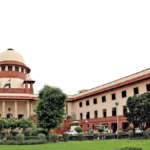
Bombay High Court Warns Against Borrowers Taking Law Into Their Own Hands
Table of Contents
Concerned about an increasing tendency of debtors turning to extrajudicial procedures, the Bombay High Court has emphasized that such actions are intolerable in a civilized legal system. In addressing a matter involving purported attempts by borrowers to evade court orders by pressing a Non-Banking Finance Company (NBFC) against complying with a property transfer mandate, the division bench of Justices BP Colabawalla and Somasekhar Sundaresan made these statements.
The Court’s observation is based on a recent occurrence in which three borrowers gave the Court a solemn pledge but yet tried to unduly influence the authorized officer of an NBFC. The Court issued a show cause notice to the borrowers, demanding them to explain why contempt of court action should not be taken against them, in response to their activities, which included placing conditions on the NBFC and trying to go beyond the bounds of court orders.
The Court had previously ordered on March 13 that the debtors turn over ownership of a secured asset to Cholamandalam Investment & Finance Company so that it could be put up for auction. Although the borrowers first consented to cooperate, further events showed that they were trying to impose their will on the NBFC in defiance of the court’s orders.
The debtors continued to try to sabotage the sale of the property, even after the NBFC assured them that it had not accepted their conditions. This caused the auction buyer to become concerned and eventually brought legal action.
The Court cited instances in which the debtors had previously trespassed onto the secured asset, leading to the filing of a formal complaint against them. In light of this history, the Court emphasized how grave the borrowers’ acts of disobeying court orders and trying to impose unapproved conditions were.
The Court signaled its intention to preserve the integrity of court orders and discourage future wrongdoing by ordering the borrowers and their attorneys to appear in court and give justifications for their actions.
In summary
The Bombay High Court’s position emphasises how crucial it is to abide by court rulings and legal procedures when settling disputes. The Court underscores its commitment to maintaining the integrity of the legal system and preserving the rule of law by issuing a strong warning against borrowers’ attempts to circumvent the law.
FAQ:
- What made the Bombay High Court worried about the behaviour of the borrowers?
The Court raised concerns about cases in which debtors tried to persuade a Non-Banking Finance Company (NBFC) not to follow court orders, underscoring a larger pattern in which debtors resort to extrajudicial actions. - What steps did the Court take to address the behavior of the borrowers?
show cause notice was sent by the court to the borrowers, asking them to explain why they shouldn’t be held in contempt of court. The Court also ordered the borrowers and their attorneys to come into court to give an explanation for their conduct. - How did the NBFC react when the borrowers tried to put terms on the loan?
The NBFC made it clear that it had only acknowledged receiving the borrowers’ letter and had not consented to the terms they had set. The NBFC’s position demonstrates its dedication to following judicial rulings and legal guidelines.
Barelaw, an online platform dedicated to delivering comprehensive legal knowledge, proudly presents its exclusive category of case briefs. This section is meticulously crafted to offer insightful analyses of landmark judgments, providing a valuable resource for legal professionals, students, and anyone interested in understanding the intricacies of law. Our case briefs delve deep into pivotal court decisions, exploring the rationale behind each judgment and its impact on the legal landscape.
We understand that navigating the complexities of legal judgments can be challenging. That’s why our case briefs are designed to be both informative and accessible, ensuring that readers gain a clear understanding of the key legal principles involved. Each brief includes a summary of the facts, the legal issue at hand, the court’s reasoning, and the ultimate decision. This structured approach makes it easier for our audience to grasp the nuances of each case.
We understand that navigating the complexities of legal judgments can be challenging. That’s why our case briefs are designed to be both informative and accessible, ensuring that readers gain a clear understanding of the key legal principles involved. Each brief includes a summary of the facts, the legal issue at hand, the court’s reasoning, and the ultimate decision. This structured approach makes it easier for our audience to grasp the nuances of each case.
Explore our case briefs and immerse yourself in the world of law. Visit our website now and discover the wealth of legal knowledge at your fingertips. The link is provided below for your convenience and direct access to our expansive legal database
You can access more legal drafts here – https://www.barelaw.in/legal-drafts/





